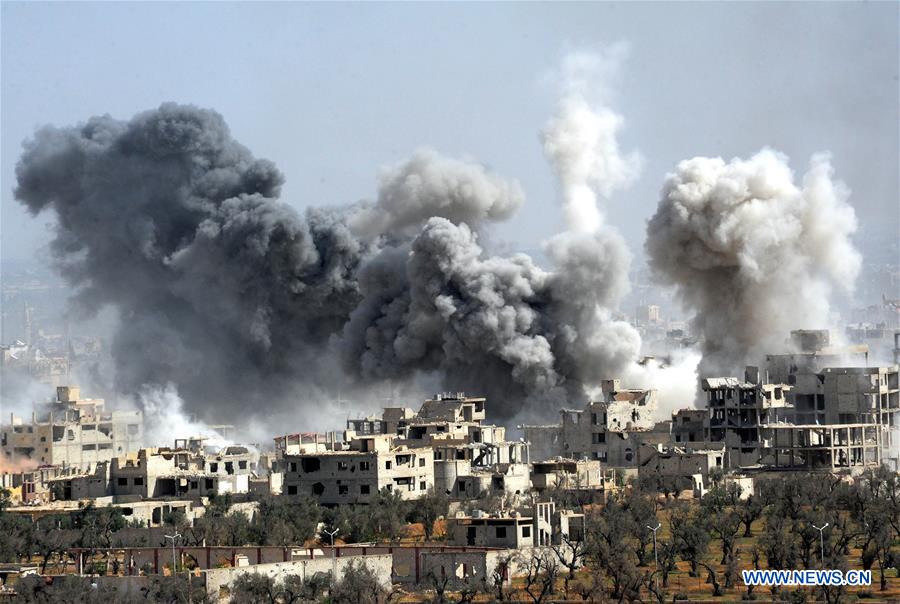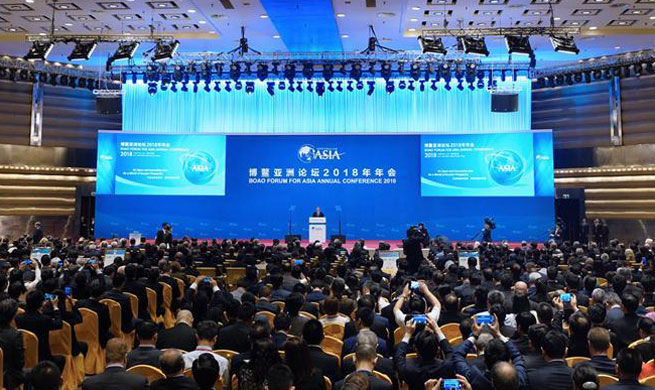
Smoke rises after the Syrian army's shelling targeted the Douma district in Eastern Ghouta countryside of Damascus, Syria, on April 7, 2018. The Syrian army on Saturday stormed the frontlines of the Islam Army in the Douma district of the capital Damascus' Eastern Ghouta countryside, state news agency SANA reported. (Xinhua/Ammar Safarjalani)
DAMASCUS, April 9 (Xinhua) -- In 2003, the U.S. invaded Iraq over what later appeared to be false intelligence information, dragging an entire country into the woes of war.
In 2018, the U.S. is threatening to strike Syria, again over allegations of chemical weapons use based on photos and videos that have yet to be verified.
After quickly striking Syria last year over claims of a chemical attack by the Syrian army on a rebel-held area in northwestern Syria, the U.S. has been threatening a similar move while accusing the Syrian army of carrying out a chlorine gas attack on the rebel-held Douma district near Damascus.
The U.S. has been warning of retaliation against what it called chemical attacks by the Syrian army on the rebels in Eastern Ghouta, where the Syrian army was steadily advancing.
The Syrian government has repeatedly denied using or having such weapons. The government also said the Syrian army was making progress and it does not need to use chemical weapons.
On Monday, the UN Security Council held emergency meetings on Syria following the alleged chemical weapons attack on Saturday.
The tension was obvious between the representatives of the U.S. and Russia.
The Russian envoy Vassily Nebenzia said the photos of the chemical attack in Douma were fabricated, proposing to send an investigation team to Douma to examine the claims.
But U.S. Ambassador to the UN Nikki Haley directly accused Russia, saying Russia's hands are smeared with the "blood of Syrian children."
"Either way, the United States will respond" to the alleged chemical attack whether the UN Security Council acted or not, Haley said.
U.S. President Donald Trump also struck a warmongering tone when he said "major decisions" on Syria will be made within the next 48 hours.
He said his country was still investigating the possible involvement of the Iranian and Russian governments in the alleged attack.
"If it's Russia, if it's Syria, if it's Iran, if it's all of them together, we'll figure it out," he said.
A day earlier, the Syrian Foreign Ministry responded to the rebels' claims of chemical weapons use in Douma district near Damascus as "premeditated pretexts," according to state news agency SANA.
The ministry said the allegations of chemical weapons use were premeditated to prolong the lives of the "terrorists" in Douma.
The ministry said the rebels use such allegations every time the army makes progress.
Ali Haidar, minister of national reconciliation, told Xinhua in an interview late last month that the United States has a premeditated will to strike Syria, and is studying the possibilities and the results of such an "aggression."
"The U.S. aggressions are not new, and it won't be the first one, but the difference is that in previous times they would strike and say by mistake, but now they have a premeditated intention for the aggression," he said.
But Haidar also said the Americans must make several calculations before they could carry out their aggression on Syria.
The U.S. must take into consideration the "power balance in the region and the Syrian reaction to such strike as well as the Russian stance," he explained.

















